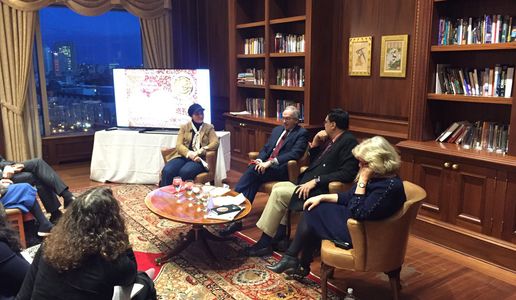Mudarri Fund Launches With Panel on Arab Golden Age
The Frederick S. Pardee School of Global Studies at Boston University launched the Corinne Mudarri Arab Civilization Fund on October 26, 2016 with a reception followed by a panel discussion entitled “The Arab Golden Age: Why Then; Why Not Now?” The event was attended by faculty and students from Boston University as well as other area universities.
Corinne Mudarri (DGE ’51), who attended the launch, is a retired American Airlines official — a position she held for 25 years. Since retiring, she has published a Massachusetts Almanac of Arab Americans and retains a deep interest in developing better understanding of Arab civilization, especially among young people. Mudarri previously endowed the Nicholas and Eugenie Mudarri Family Student Exchange Fund at Boston University in memory of her parents.
Najam introduced the Mudarri Fund and thanked Corinne Mudarri for her continuing generosity to Boston University and to the Pardee School. He said the Mudarri Fund will serve as a multidisciplinary resource for the entire Boston University community — bringing together faculty and students from different backgrounds to explore the many contributions of Arab civilization to modern culture and society.
“The Mudarri Fund is very much conceived as a university-wide program. My ambition is that it will bring together all of the people who are interested in the civilizational aspects of this region for the types of multidisciplinary activities that define the Pardee School,” Najam said. “This initiative is designed to support thoughtful and wide-reaching programming and curricular innovation that explores and promotes the many contributions of Arab civilization, culture and society, including, but not limited to, innovations such as mathematics, science, medicine, philosophy, language, art, architecture and horticulture.”
The panel began with a brief video detailing the developments in chemistry made by Arab civilization and the introduction of industrial production of soap in Aleppo (now in Syria).
Panelists included Director of the Institute for the Study of Muslim Societies and Civilizations and Associate Professor of History Betty Anderson, Professor Eman M. Ghoneim of the University of North Carolina, and Dr. Ehsan Masood of the Imperial College of London and author of Science and Islam: A History. The conversation was moderated by Pardee School Dean Adil Najam.
Masood said that the Arab Golden Age was golden due to the discovery and invention in many fields including natural sciences, humanities, engineering, technology, physics and chemistry. In particular, he singled out the development of the modern hospital as an institution that was conceived and flourished in this period of Arab history.
Anderson added that the ‘Arab Golden Age’, considered to have been roughly from the 8th century to the 13th century AD, was a remarkable period in history in part because of the lack of hostility given the very significant diversity that existed at the time.
“For so many hundreds of years, there was very little hostility between groups. There were so many ways to live together with so much diversity — a word we use today which they wouldn’t have used,” Anderson said. “So much of that got thrown out with the bathwater in the 19th century with the modern state and colonialism.”
Ghoneim said that the openness of society during the Arab Golden Age had huge impact on the innovations made in a variety of fields at the time. She highlighted the advances made by Arab geographers and cartographers at the time.
“You had a common language, there were no political barriers — all the scholars back then used to travel easily with no ethnic or language problems,” Ghoneim said. “It was easy for all scholars, scientists and geographers to travel long distances, exchange ideas with different people, see different landscapes and see different cultures.”
The audiences participated in the discussion and questions were raised about the role of religion in these developments and also about the reasons that led to the sudden conclusion of the golden age.
Najam announced that more events and initiatives under the Mudarri Fund will be held later this academic year and in years to come that will focus on various aspects of historical and contemporary Arab civilization. In particular, he emphasized his hope that special preference will be given to events and initiatives that are student focused.
